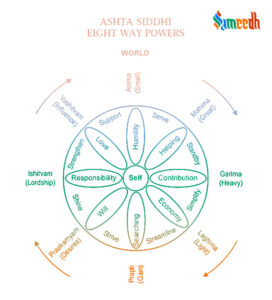The last Siddhi, Vasitva Siddhi is the supreme ability to control other living beings’ minds. Naturally, the person who has obtained this mystical power can govern life and death matters too. Once this Siddhi is attained, the person becomes immensely powerful as he can dominate over other beings.

“Vasitva Siddhi” refers to the attainment of the ability to control or subdue others. This particular Siddhi is associated with supernatural or mystical powers within Hinduism, particularly in the context of spiritual practices, yoga, and tantra.
The term “Vasitva” is derived from the Sanskrit root “vas,” which means to control or subdue. “Siddhi” refers to accomplishment or attainment. Therefore, “Vasitva Siddhi” represents the achievement of mastery over others or the ability to exert influence and control.
In various spiritual traditions and scriptures, including the Yoga Sutras of Patanjali and Tantras, Siddhis like “Vasitva Siddhi” are described as potential abilities attained through rigorous spiritual practice, meditation, and the awakening of latent potentials within the individual.
In Hindu mythology and scriptures, there are various instances where individuals are believed to have attained mastery over others or exhibited extraordinary powers of control or influence, which could be interpreted as manifestations of “Vasitva Siddhi.” Here are a few examples:
- Lord Krushna: Lord Krushna, an incarnation of Vishnu, is revered for his divine qualities and miraculous deeds. In the Mahabharat, Krushna serves as a charioteer and advisor to Arjun during the Kurukshetra War. He uses his wisdom, diplomacy, and divine powers to guide the Pandavs to victory. Krushna’s ability to influence events and sway the course of the war exemplifies mastery over circumstances and individuals.
- Ravan: Ravan, the antagonist of the Ramayan, is depicted as a powerful demon king with extraordinary abilities. He is said to have acquired Siddhis through intense penance and devotion to Shiv. Ravan’s ability to control powerful beings, such as demons and supernatural creatures, as well as his mastery over magic and warfare, showcases his dominance and influence over others.
- Hanuman: Hanuman, the devoted disciple of Lord Ram, is revered for his exceptional strength, intelligence, and loyalty. He played a crucial role in the Ramayan, including locating Sita, battling demons, and helping Ram in his quest to defeat Ravan. Hanuman’s ability to inspire and command armies of monkeys and demons reflects his mastery over others through his divine qualities and devotion to Ram.
- Chanakya: Chanakya, also known as Kautilya or Vishnugupta, was an ancient Indian philosopher, teacher, economist, and political strategist. He is credited with playing a key role in the establishment of the Maurya Empire under Chandragupta Maurya. Chanakya’s astute political acumen, strategic planning, and ability to influence kings and rulers exemplify his mastery over political affairs and individuals.
- Durga: Goddess Durga, a manifestation of the divine feminine energy, is depicted as a fierce warrior goddess who defeats the buffalo demon Mahishasur and other powerful demons. Durga’s ability to vanquish evil forces and restore balance in the universe showcases her mastery over cosmic energies and her power to control and subdue negative forces.
These examples illustrate instances where individuals or divine beings are believed to have attained mastery over others or exhibited extraordinary powers of control or influence, which align with the concept of “Vasitva Siddhi” in Hindu mythology and tradition.
It’s important to note that while the attainment of Siddhis such as “Vasitva Siddhi” is acknowledged within Hindu spirituality, the emphasis is often placed on using such powers responsibly and for the benefit of others rather than for personal gain or ego gratification. Additionally, many spiritual teachers caution against becoming attached to Siddhis, as they can be distractions on the path to spiritual liberation (moksh).